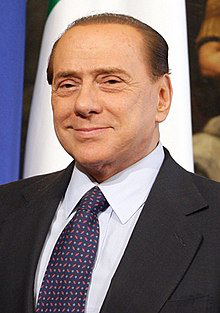

Prime Minister of Italy
29 September 1936 Milan, Kingdom of Italy
-
8 May 2008 – 16 November 2011
Italian politician and media tycoon "Berlusconi" redirects here. For other uses, see Berlusconi (disambiguation). This article is part of a series about Silvio Berlusconi Occupation Fininvest Mediaset AC Milan Political offices Prime Minister of Italy (1994–1995; 2001–2006; 2008–2011) Political career Berlusconism Policies of Silvio Berlusconi Naples G7 summit Contract with the Italians Genoa G8 summit Diaz raid War in Afghanistan War in Iraq Editto Bulgaro Wiretapping Bill L’Aquila G8 summit Military intervention in Libya 2011 protests Migrant crisis European debt crisis Resignation Parties Forza Italia People of Freedom Forza Italia Coalitions Centre-right coalition Pole of Freedoms Pole of Good Government Pole for Freedoms House of Freedoms Elections 1994 1996 2001 2006 2008 2013 2018 Cabinets I II III IV Legal problems Propaganda 2 David Mills financial allegations Links with Mafia Prostitute trial Panama Papers Consolidation of media AC Milan 80s 90s 2000s 2010s vte Silvio Berlusconi (/ˌ b ɛər l ʊ ˈ s k oʊ n i / BAIR -luu-SKOH -nee; Italian: ( listen ) ; born 29 September 1936) is an Italian media tycoon and politician who served as Prime Minister of Italy in four governments from 1994 to 1995, 2001 to 2006 and 2008 to 2011. He was a member of the Chamber of Deputies from 1994 to 2013 and has served as a Member of the European Parliament (MEP) since 2019, and previously from 1999 to 2001. Berlusconi is the controlling shareholder of Mediaset and owned the Italian football club A.C. Milan from 1986 to 2017. He is nicknamed Il Cavaliere (The Knight) for his Order of Merit for Labour, although he voluntarily resigned from this order in March 2014. In 2018, Forbes magazine ranked him as the 190th richest man in the world with a net worth of US$8.0 billion. In 2009, Forbes ranked him 12th in the List of The World's Most Powerful People due to his domination of Italian politics, throughout more than twenty years at the head of the centre-right coalition. Berlusconi was Prime Minister for nine years in total, making him the longest serving post-war Prime Minister of Italy, and the third longest-serving since Italian unification, after Benito Mussolini and Giovanni Giolitti. He was the leader of the centre-right party Forza Italia from 1994 to 2009, and its successor party The People of Freedom from 2009 to 2013. Since November 2013, he has led a revived Forza Italia. Berlusconi was the senior G8 leader from 2009 until 2011 and he currently holds the record for hosting G8 Summits (having hosted three Summits in Italy). After serving nearly 19 years as a member of the Chamber of Deputies, Italy's lower house, after the 2013 general election he became a member of the Senate. On 1 August 2013, he was convicted of tax fraud by the court of final instance, the Court of Cassation, confirming his four-year prison sentence (of which three years are automatically pardoned) along with a public office ban for two years. As his age exceeded 70 years, he was exempted from direct imprisonment, and instead served his sentence by doing unpaid social community work. Because he had been sentenced to a gross imprisonment for more than two years, a new Italian anti-corruption law led to the Senate expelling and barring him from serving in any legislative office for six years. Berlusconi pledged to stay leader of Forza Italia throughout his custodial sentence and public office ban. After his ban ended, Berlusconi ran for and was successfully elected as an MEP at the 2019 European Parliament election. Berlusconi was the first person to assume the premiership without having held any prior government or administrative offices. He is known for his populist political style and brash personality. In his long tenure, he was often accused of being an authoritarian leader and a strongman. Berlusconi still remains a controversial figure who divides public opinion and political analysts. Supporters emphasize his leadership skills and charismatic power, his fiscal policy based on tax reduction, and his ability to maintain strong and close foreign relations with both the United States and Russia. In general, critics address his performance as a politician, and the ethics of his government practices in relation to his business holdings. Issues with the former include accusations of having mismanaged the state budget and of increasing the Italian government debt. The second criticism concerns his vigorous pursuit of his personal interests while in office, including benefitting from his own companies' growth due to policies promoted by his governments, having vast conflicts of interest due to ownership of a media empire with which he has restricted freedom of information and finally, being blackmailed as leader because of his turbulent private life.

We use cookies
We use cookies and other tracking technologies to improve your browsing experience on our website, to show you personalized content and targeted ads, to analyze our website traffic, and to understand where our visitors are coming from. Privacy Policy.